英语中表示时间的介词和应用
时间介词In、on、at在课堂上的应用
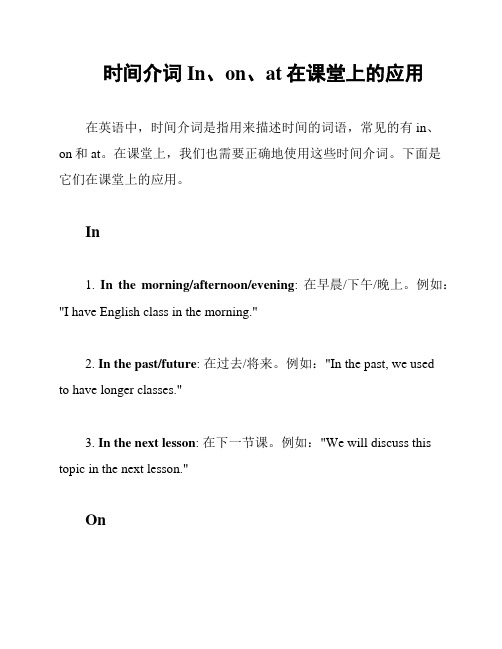
时间介词In、on、at在课堂上的应用在英语中,时间介词是指用来描述时间的词语,常见的有in、on和at。
在课堂上,我们也需要正确地使用这些时间介词。
下面是它们在课堂上的应用。
In1. In the morning/afternoon/evening: 在早晨/下午/晚上。
例如:"I have English class in the morning."2. In the past/future: 在过去/将来。
例如:"In the past, we usedto have longer classes."3. In the next lesson: 在下一节课。
例如:"We will discuss this topic in the next lesson."On1. On Monday/Tuesday/Wednesday, etc.: 在星期一/星期二/星期三等。
例如:"We have a test on Friday."2. On the first/second/third, etc. day of the week: 在星期的第一/第二/第三等天。
例如:"On the first day of the week, we review previous lessons."3. On a specific date: 在具体日期。
例如:"Our final exam is on December 15th."At1. At a specific time: 在具体时间。
例如:"The class starts at 9 o'clock."2. At the beginning/end of the class: 在课堂的开始/结束时。
例如:"At the beginning of the class, we will review homework."3. At the same time: 同时。
介词in-on-at在表示时间时的用法
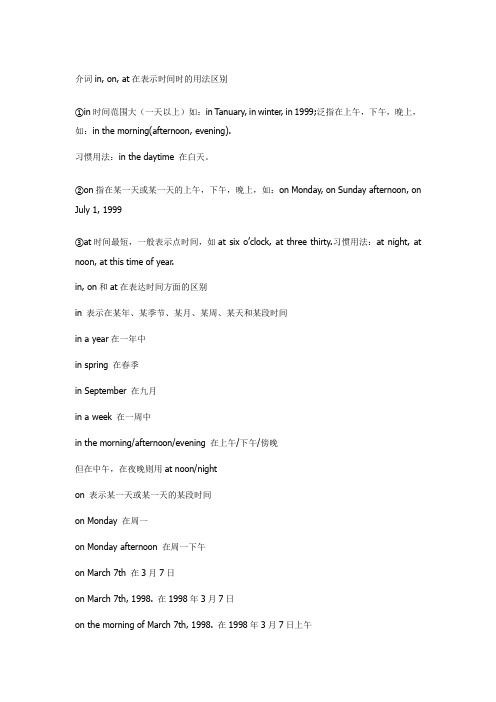
介词in, on, at在表示时间时的用法区别①in时间范围大(一天以上)如:in Tanuary, in winter, in 1999;泛指在上午,下午,晚上,如:in the morning(afternoon, evening).习惯用法:in the daytime 在白天。
②on指在某一天或某一天的上午,下午,晚上,如:on Monday, on Sunday afternoon, on July 1, 1999③at时间最短,一般表示点时间,如at six o’clock, at three thirty.习惯用法:at night, at noon, at this time of year.in, on和at在表达时间方面的区别in 表示在某年、某季节、某月、某周、某天和某段时间in a year在一年中in spring 在春季in September 在九月in a week 在一周中in the morning/afternoon/evening 在上午/下午/傍晚但在中午,在夜晚则用at noon/nighton 表示某一天或某一天的某段时间on Monday 在周一on Monday afternoon 在周一下午on March 7th 在3月7日on March 7th, 1998. 在1998年3月7日on the morning of March 7th, 1998. 在1998年3月7日上午at 表示某个具体时刻。
at eight o’clock 在8点钟at this time of the year 在一年中的这个时候at the moment 在那一时刻at that time 在那时注意:在英语中,如果时间名词前用this, last, next 等修饰时,像这样的表示,“在某时”的时间短语前,并不需要任何介词。
例如:last month, last week, this year, this week, next year, the next day, the next year 等。
介词in,on,at在表示时间时的区别
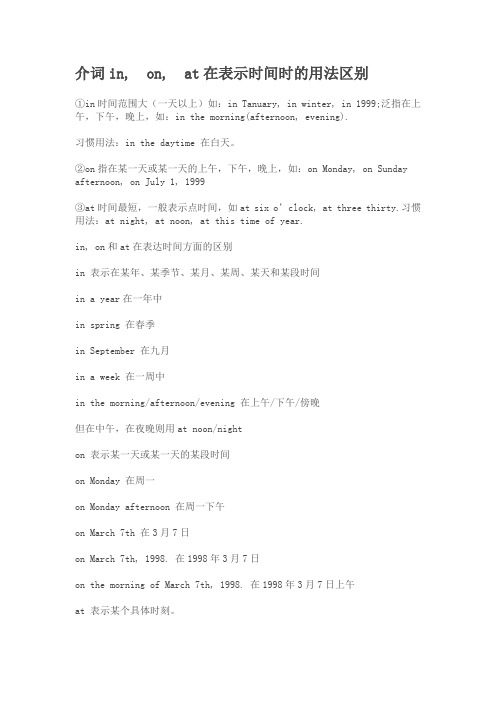
介词in, on, at在表示时间时的用法区别①in时间范围大(一天以上)如:in Tanuary, in winter, in 1999;泛指在上午,下午,晚上,如:in the morning(afternoon, evening).习惯用法:in the daytime 在白天。
②on指在某一天或某一天的上午,下午,晚上,如:on Monday, on Sunday afternoon, on July 1, 1999③at时间最短,一般表示点时间,如at six o’clock, at three thirty.习惯用法:at night, at noon, at this time of year.in, on和at在表达时间方面的区别in 表示在某年、某季节、某月、某周、某天和某段时间in a year在一年中in spring 在春季in September 在九月in a week 在一周中in the morning/afternoon/evening 在上午/下午/傍晚但在中午,在夜晚则用at noon/nighton 表示某一天或某一天的某段时间on Monday 在周一on Monday afternoon 在周一下午on March 7th 在3月7日on March 7th, 1998. 在1998年3月7日on the morning of March 7th, 1998. 在1998年3月7日上午at 表示某个具体时刻。
at eight o’clock 在8点钟at this time of the year 在一年中的这个时候at the moment 在那一时刻at that time 在那时注意:在英语中,如果时间名词前用this, last, next 等修饰时,像这样的表示,“在某时”的时间短语前,并不需要任何介词。
例如:last month, last week, this year, this week, next year, the next day, the next year等。
in on at做时间介词的用法 -回复
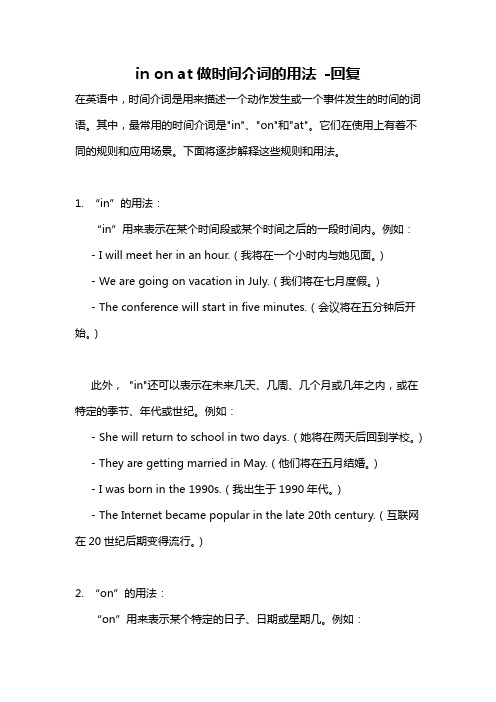
in on at做时间介词的用法-回复在英语中,时间介词是用来描述一个动作发生或一个事件发生的时间的词语。
其中,最常用的时间介词是"in"、"on"和"at"。
它们在使用上有着不同的规则和应用场景。
下面将逐步解释这些规则和用法。
1. “in”的用法:“in”用来表示在某个时间段或某个时间之后的一段时间内。
例如:- I will meet her in an hour.(我将在一个小时内与她见面。
)- We are going on vacation in July.(我们将在七月度假。
)- The conference will start in five minutes.(会议将在五分钟后开始。
)此外,"in"还可以表示在未来几天、几周、几个月或几年之内,或在特定的季节、年代或世纪。
例如:- She will return to school in two days.(她将在两天后回到学校。
)- They are getting married in May.(他们将在五月结婚。
)- I was born in the 1990s.(我出生于1990年代。
)- The Internet became popular in the late 20th century.(互联网在20世纪后期变得流行。
)2. “on”的用法:“on”用来表示某个特定的日子、日期或星期几。
例如:- I have a meeting on Monday.(我星期一有个会议。
)- Our anniversary is on March 15th.(我们的纪念日是在3月15日。
)- The concert will be held on Friday.(音乐会将在星期五举行。
)此外,“on”还可用于特定的假日或节日。
例如:- We celebrate Christmas on December 25th.(我们在12月25日庆祝圣诞节。
介词inonat在表示时间时的用法区别
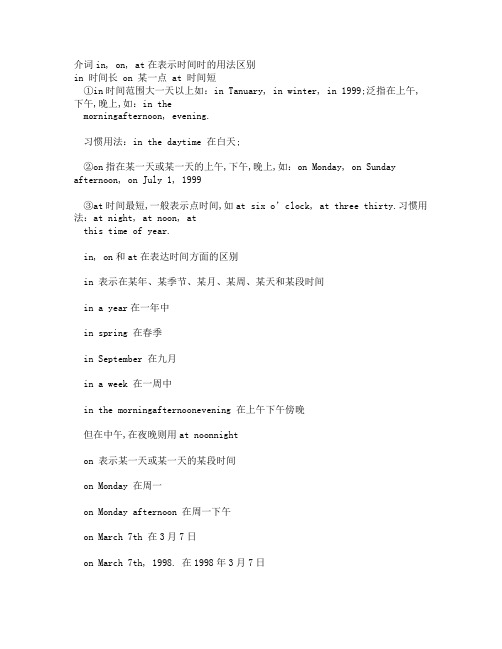
介词in, on, at在表示时间时的用法区别in 时间长 on 某一点 at 时间短①in时间范围大一天以上如:in Tanuary, in winter, in 1999;泛指在上午,下午,晚上,如:in themorningafternoon, evening.习惯用法:in the daytime 在白天;②on指在某一天或某一天的上午,下午,晚上,如:on Monday, on Sunday afternoon, on July 1, 1999③at时间最短,一般表示点时间,如at six o’clock, at three thirty.习惯用法:at night, at noon, atthis time of year.in, on和at在表达时间方面的区别in 表示在某年、某季节、某月、某周、某天和某段时间in a year在一年中in spring 在春季in September 在九月in a week 在一周中in the morningafternoonevening 在上午下午傍晚但在中午,在夜晚则用at noonnighton 表示某一天或某一天的某段时间on Monday 在周一on Monday afternoon 在周一下午on March 7th 在3月7日on March 7th, 1998. 在1998年3月7日on the morning of March 7th, 1998. 在1998年3月7日上午at 表示某个具体时刻;at eight o’clock 在8点钟at this time of the year 在一年中的这个时候at the moment 在那一时刻at that time 在那时注意:在英语中,如果时间名词前用this, last, next 等修饰时,像这样的表示,“在某时”的时间短语前,并不需要任何介词;例如:last month, last week, this year, this week, next year, the next day, thenext year等;1.What’s the weather like in springsummerautumnwinter in yourcountry你们国家春天夏天秋天冬天的天气怎么样in 在年、月、周较长时间内in a week 在里面in the room用某种语言in English 穿着in redon 某日、某日的上下午on Sunday afternoon 在……上面on the desk 靠吃……为生live on rice 关于 a book on Physics〔误〕 We got to the top of the mountain in daybreak.〔正〕 We got to the top of the mountain at day break.〔析〕 at用于具体时刻之前,如:sunrise, midday, noon, sunset, midnight, night;〔误〕 Don't sleep at daytime〔正〕 Don't sleep in daytime.〔析〕 in 要用于较长的一段时间之内,如:in the morning afternoon, 或in the week monthyear. 或 in spring supper autumn winter等等;〔误〕 We visited the old man in Sunday afternoon.〔正〕 We visited the old man on Sunday afternoon.〔析〕 in the morning, in the afternoon 如果在这两个短语中加入任何修饰词其前面的介词都要改为on, 如:on a coldmorning, on the morning of July 14th〔误〕 He became a writter at his twenties〔正〕 He became a writter in his twenties〔析〕这句话应译为:他在20多岁时就成了作家;在某人的一段生活时间段中要用介词in来表示,而在具体岁数时用at来表示;〔误〕 He went to New York to find a job in sixteen years old.〔正〕 He went to New York to find a job at sixteen.〔析〕在具体年岁前用at, 如:at the age of 12, at your age, 等等;〔误〕 We went to swim in the river in a very hot day.〔正〕 We went to swim in the river on a very hot day.〔析〕具体某一天要用介词on, 又如:on New Year's Day〔误〕 I'm looking forward to seeing you on Christmas.〔正〕 I'm looking for ward to seeing you at Christmas.〔析〕在节日的当天用on,而全部节日期间用at,Christmas是圣诞节期间,一般要有两周或更长的时间;〔误〕 I haven't see you during the summer holidays.〔正〕 I haven't seen you since the beginning of the summerholidays.〔析〕 during表示在某一段时间之内,所以一般不与完成时搭配,如:Ivisited a lot of museums during theholiday. 而for表示一段时间,可以用于完成时,如:I haven't see you for a long time. 而through用来表示时间时则为整整,全部的时间;如:It rained through thenight.而since则是表达主句动作的起始时间,一般要与完成时连用;〔误〕 At entering the classroom, I heard the good news.〔正〕 On entering the classroom, I heard the good news.〔析〕 On 加动名词表示一……就;本句的译文应是:我一进入教室就听见这个好消息了;又如:on hearing… 一听见, on arrival一到达就……on表示动作的名词〔误〕 In the beginning of the book, there are some interesting stories.〔正〕 At the beginning of the book, there are some interesting stories.〔析〕 at the begining与at the end都是指某事物的开始与结束部分,均不指时间范围,而in the beginning则是指开始一段时间;in the end=at last是指最终,终于之意;〔误〕 Till the end of next week. I will have finished this work.〔正〕 By the end of next week. I will have finished this work.〔析〕 by 引起的时间状语表示了动作的截止点,其意思为不迟于某一时刻将工作做完,所以主句一般是完成时态;当然可以有将来时态,如:I'll bethere by fiveo'clock.而till则表达其一动作一直持续到某一时刻,但句中的动词一定要用持续性动词,而瞬间的截止性动词应用其否定句式,如:I won'tfinish this work tilluntil next weekend.〔误〕 He came to London before last weekend.〔正〕 He had come to London before last weekend.〔正〕 He came to London two weeks ago.〔析〕 before 一般要与完成时连用,而ago则与一般过去时连用;〔误〕 I have studied English for three years gince I had come here.〔正〕 I have studied English for three years since I came here.〔析〕 since用来表达主句动作的开始时间,所以其引出的从句中应为过去时,而不能用完成时态〔误〕 I can help you repair this bike. You will get it after two hours.〔正〕 I can help you repair this bike. You will get it in two hours.〔析〕中文经常讲两小时之后来取,两天内会修好,而这个介词在英文中要用in 而不要用after;其原因有二,①after 多用于过去时,如:I arrivedin New York. After three days, I found a job in the bank. ② after加时间是表达一个不确定的时间范围,如:after three days, 即三天之后的哪一天都可以;所以在许诺若干时间内会完成某事时,一定要用介词in;〔误〕 Three days after he died.〔正〕 After three days he died.〔正〕 Three days later he died.〔析〕 after 与 later都可以用来表达一段时间之后,但它们所处的位置不同,after 在时间词前,而later在时间词后;〔误〕 She hid herself after the tree.〔正〕 She hid herself behind the tree.〔析〕 after多用来表达某动作之后,所以有的语法书中称它为动态介词,如:I run after him. After finishing myhomework, I went to see a film. 而behind则多用于静态事物之后;〔误〕 There is a beautiful bird on the tree.〔正〕 There is a beautiful bird in the tree.〔析〕树上长出的果实,树叶要用on, 而其他外来的人、物体均要用in the tree.〔误〕 Shanghai is on the east of China.〔正〕 Shanghai is in the east of China.〔析〕在表达地理位置时有3个介词:in, on, to; in表示在某范围之内; on 表示与某地区接壤;to则表示不相接;如:Japan is tothe east of China.〔误〕 I arrived at New York on July 2nd.〔正〕 I arrived in New York on July 2nd.〔析〕 at用来表达较小的地方,而in用来表达较大的地方;at常用于at the school gate, at home, at a bus stop,at the station, at the cinema, at a small village;〔误〕 He lived in No. 3 Beijing Road.〔正〕 He lived at No. 3 Beijing Road.〔析〕在门牌号码前要用at, 并要注意它的惯用法:at the end of the street, at the foot of themountain, at the top of the page;〔误〕 There is a colour TV set at the corner of the hall.〔正〕 There is a colour TV set in the corner of the hall.〔析〕在屋内的角落应用in,而墙的外角用at,如:There is a tree at the corner of the street.〔误〕 This weekend I'll stay in Uncle Wang's.〔正〕 This weekend I'll stay at Uncle Wang's.〔析〕要注意英文的特殊表达法,如:at a tailor's shop 裁缝店=at a tailor's, at the doctor's去看病 at the bookseller's 在书店 at uncle Wang's 在王叔叔家〔误〕 Do you know there is some good news on today's newspaper〔正〕 Do you know there is some good news in today's newspaper〔析〕在报纸上的新闻要用in, 而在具体某一版上,或某一页上则要用on;〔误〕 The school will begin on September 1st.〔正〕 School will begin on September 1st.〔析〕这里的school应看作不可数名词泛指学校的课程,即开学之意;要注意,有些活动场所当表达正在从事该种活动时不要加冠词,如:at table吃饭, When I came to Tom's home, they were at table. 还有: at desk 学习,at work工作 at school 上学, in hospital 住医院 at church 作礼拜如加上定冠词则另有他意,如:at theschool 即在学校工作或办事,in the hospital 即在医院工作或去看望病人;〔误〕 In my way to the station, I bought a newspaper to kill time.〔正〕 On my way to the station, I bought a newspaper to kill time.〔析〕译文为:在去车站的路上我买了份报纸,为的是消磨时光在……的路上应用on one's way…;而 in the way有挡道之意,如:Please move the chair it is in the way;。
英语中时间介词的at, in, on的区别和用法大全
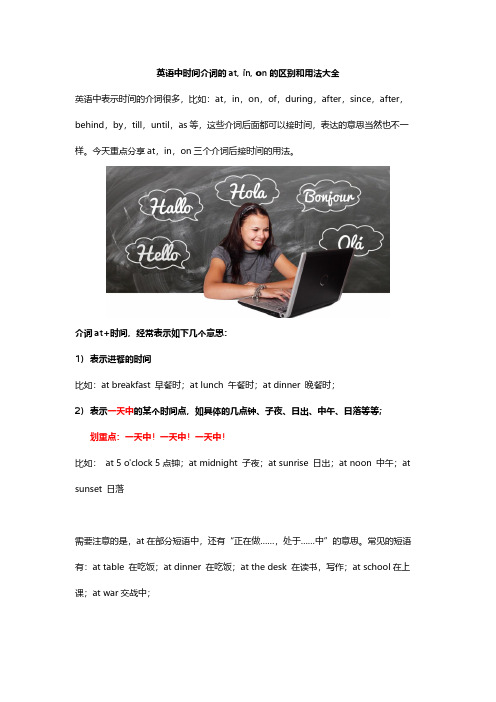
英语中时间介词的at, in, on的区别和用法大全英语中表示时间的介词很多,比如:at,in,on,of,during,after,since,after,behind,by,till,until,as等,这些介词后面都可以接时间,表达的意思当然也不一样。
今天重点分享at,in,on三个介词后接时间的用法。
介词at+时间,经常表示如下几个意思:1)表示进餐的时间比如:at breakfast 早餐时;at lunch 午餐时;at dinner 晚餐时;2)表示一天中的某个时间点,如具体的几点钟、子夜、日出、中午、日落等等;划重点:一天中!一天中!一天中!比如:at 5 o'clock 5点钟;at midnight 子夜;at sunrise 日出;at noon 中午;at sunset 日落需要注意的是,at在部分短语中,还有“正在做……,处于……中”的意思。
常见的短语有:at table 在吃饭;at dinner 在吃饭;at the desk 在读书,写作;at school在上课;at war交战中;介词in+时间,表示一段时间,如上午、下午、周、月、年、季节、世纪等;比如:in 2019 2019年;in the morning 上午;in the afternoon 下午;in two weeks 两周后;in September 在9月;in the 20th century 在20世纪;拓展:in the middle of September 和at the middle of September有什么区别呢?看下面的例句:In the middle of September, I will be back. 我在9月中旬回来(指的是9月10日~20日)At the middle of September, I will be back. 我在9月15日左右回来。
介词in on at在表示时间时的用法区别
介词in, on, at在表示时间时的用法区别in 时间长 on 某一点 at 时间短①in时间范围大(一天以上)如:in Tanuary, in winter, in 1999;泛指在上午,下午,晚上,如:in themorning(afternoon, evening).习惯用法:in the daytime 在白天。
②on指在某一天或某一天的上午,下午,晚上,如:on Monday, on Sunday afternoon, on July 1, 1999③at时间最短,一般表示点时间,如at six o’clock, at three thirty.习惯用法:at night, at noon, atthis time of year.in, on和at在表达时间方面的区别in 表示在某年、某季节、某月、某周、某天和某段时间in a year在一年中in spring 在春季in September 在九月in a week 在一周中in the morningafternoonevening 在上午下午傍晚但在中午,在夜晚则用at noonnighton 表示某一天或某一天的某段时间on Monday 在周一on Monday afternoon 在周一下午on March 7th 在3月7日on March 7th, 1998. 在1998年3月7日on the morning of March 7th, 1998. 在1998年3月7日上午at 表示某个具体时刻。
at eight o’clock 在8点钟at this time of the year 在一年中的这个时候at the moment 在那一时刻at that time 在那时注意:在英语中,如果时间名词前用this, last, next 等修饰时,像这样的表示,“在某时”的时间短语前,并不需要任何介词。
例如:last month, last week, this year, this week, next year, the next day, thenext year等。
表示时间介词用法
What does Jim often do on Monday
Xiaoyan: I’ve got my fitness program from the gym for this
month. Which
Mary: ⑴
class do you have tomorrow, Xiaoyan
Xiaoyan: ToWmohrorow-Tuesday-I haven’t got a class. I do gym.
一般疑问句
简略回答
Was I…
Yes, I was.
No, I wasn’t.
Were you…
Yes, we were. No, we weren’t.
Was he/she/it… Yes, he/she/it was. No, he/she/it wasn’t.
Were we…
Yes, we were. No, we weren’t.
*注意:具体某天的上午、下午或晚上要用介词on,如: They will have dinner together on Sunday evening.
*注意:以下名词与介词的固定搭配: My children play in the street in the daytime. (在
白天) I can hear the cars at night. (在晚上) I go to my mother’s house at the weekend. (在周
比较级\最高级的规则及不规则变化
▪ 1 ---er/est ▪ Tall-taller-tallest, short-shorter-shortest ▪ 2. 以e结尾-r/st nice-nicer-nicest ▪ 3.重读闭音节,双写辅音字母-er/est ▪ thin-thinner-thinnest ▪ 4.已辅音字母+y结尾 去y变I-er/est ▪ busy-busier-busiest ▪ 5.多音节形容词—more/most ▪ Relaxed---more relaxed---most relaxest ▪ Note: good-better-best bad-worse-worst
英语时间前面的介词的用法
英语时间前面的介词的用法
在英语中,常用的介词来表示时间的包括:at、on、in。
1. "at" 用于具体的时刻、钟点以及特定的时间点,如"at 8 o'clock"(在八点钟时)、"at noon"(在中午)、"at midnight"(在午夜)、"at Christmas"(在圣诞节)、"at the weekend"(在周末)等。
2. "on" 用于具体的某一天、日期或特定的星期,如"on Monday"(在星期一)、"on July 4th"(在七月四日)等。
3. "in" 用于较长的时间段、月份、季节、年份等,如"in the morning"(在早上)、"in September"(在九月)、"in summer"(在夏季)、"in 2022"(在2022年)等。
需要注意的是,每个介词都有其特定的用法和搭配,因此在具体使用时需要根据时间的具体表达方式选择正确的介词。
介词in on at在表示时间时的用法区别
介词in, on, at在表示时间时的用法区别in 时间长 on 某一点 at 时间短①in时间范围大(一天以上)如:in Tanuary, in winter, in 1999;泛指在上午,下午,晚上,如:in themorning(afternoon, evening).习惯用法:in the daytime 在白天。
②on指在某一天或某一天的上午,下午,晚上,如:on Monday, on Sunday afternoon, on July 1, 1999③at时间最短,一般表示点时间,如at six o’clock, at three thirty.习惯用法:at night, at noon, atthis time of year.in, on和at在表达时间方面的区别in 表示在某年、某季节、某月、某周、某天和某段时间in a year在一年中in spring 在春季in September 在九月in a week 在一周中in the morningafternoonevening 在上午下午傍晚但在中午,在夜晚则用at noonnighton 表示某一天或某一天的某段时间on Monday 在周一on Monday afternoon 在周一下午on March 7th 在3月7日on March 7th, 1998. 在1998年3月7日on the morning of March 7th, 1998. 在1998年3月7日上午at 表示某个具体时刻。
at eight o’clock 在8点钟at this time of the year 在一年中的这个时候at the moment 在那一时刻at that time 在那时注意:在英语中,如果时间名词前用this, last, next 等修饰时,像这样的表示,“在某时”的时间短语前,并不需要任何介词。
例如:last month, last week, this year, this week, next year, the next day, thenext year等。
- 1、下载文档前请自行甄别文档内容的完整性,平台不提供额外的编辑、内容补充、找答案等附加服务。
- 2、"仅部分预览"的文档,不可在线预览部分如存在完整性等问题,可反馈申请退款(可完整预览的文档不适用该条件!)。
- 3、如文档侵犯您的权益,请联系客服反馈,我们会尽快为您处理(人工客服工作时间:9:00-18:30)。
Mary: Well. Good luck! Enjoy yourself!
4. 描述情感
*描述情感或感受,常用动词to feel. 如: --How are you feeling? --I feel much better. Thank you. 你现在感觉怎么样?我觉得好多了。谢谢你。 --How do you feel today? --I feel terrible. I’ve got a headache. 你今天感觉怎么样?我觉得很难受。我头疼。
注意:the next day 表示 过去 的时间,意为 “第二天”而不是明天,常常用在间接引语里。
2. 疑问词
Who, whom, whose, which, what, where, when, why, how(how many, how much, how old, how long, how far, how often, how soon, how big)
Xiaoyan: Nobody, I do two gym sessions on my own a week. Mary: So, ⑶ when are your classes?
Xiaoyan: This month, I do aerobics on Saturdays and Tai Chi on Mondays.
Mary: And ⑷ what do you do next month?
Xiaoyan: I do three gym sessions, but I don’t do Tai Chi –there isn’t a class.
Mary: ⑸ Why isn’t there a class? Xiaoyan: The trainer is on holiday. But it starts again the month after
*注意:以下名词与介词的固定搭配: My children play in the street in the daytime. (在白天) I can hear the cars at night. (在晚上) I go to my mother’s house at the weekend. (在周末) I go to my mother’s house onweekends. (每逢周末)
英语中 表示时间的介词 和应用
1. 表示时间的介词
*at表示“在……时刻”,与具体的钟点搭配使用, 如:
We open at seven and close at ten.
We start work at 8 o’clock.
*from…to 表 示 “ 从 …… 到 ” , from…till 表 示 “ 从 …… 直 到 …… 为 止 ” , between…and 表 示 “在……之间”, 都用于表示某一段时间。如:
注意:on Monday与on Mondays意义不完全相同。on Monday有两个意思,第一表示特指的某个星期一,第 二表示每逢星期一;而on Mondays只表示每逢星期一。
*注意:具体某天的上午、下午或晚上要用介词on,如: They will have dinner together on Sunday evening.
*on表示“在……时候”,与日期、星期搭配使用。如: I leave on Monday 25th November. He plays football on Friday.
*in表示“在……期间”,与具体的年代、月份、季节或 一天中的某个时段搭配使用。如:
The postman comes in the morning(s) and in the afternoon(s).邮递员每天上午和下午来送信。
We open from Monday to Friday. (我们星期一到星期 五都开放。)
We open from May till September. (我们五月份开始 开放,直到九月份闭馆。)
We open between seven and ten. (我们开放时间为 七点到十点之间。)
Do the EX. on P166.
2. 时间表达法
this/next/the…after 可以表达时间,如: this month(这个月)/next month(下个月)/the month after next(下下个月) this Tuesday/next Tuesday/the Tuesday after next this week/next week/the week after next this year/next year/the year after next today/tomorrow/the day after tomorrow
What does Jim often do on Monday?
Xiaoyan: I’ve got my fitness program from the gym for this month. Mary: ⑴ Which class do you have tomorrow, Xiaoyan? Xiaoyan: Tomorrow-Tuesday-I haven’t got a class. I do gym. Mary: ⑵ Who do you do gym with?
Who---主格
Who is he?
Whom---宾格 Whom do you talk with?
Whose---定语 Whose book is this?
Which---哪个,哪些(有限定的选择范围)
Which museum do you want to go to?
What --什么,什么样的(没有限定的选择范围)
